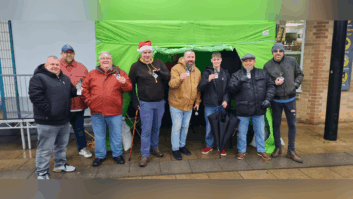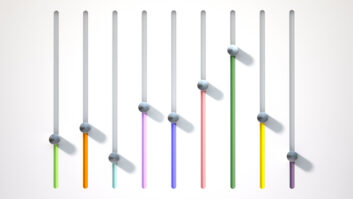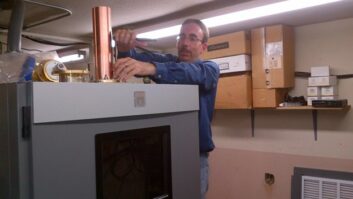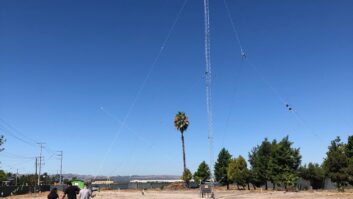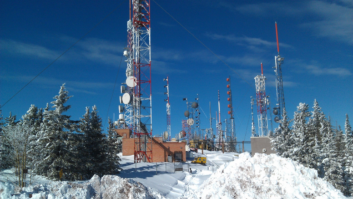
If you are new to the industry or know a budding audio professional who’s looking for a specific direction, broadcast engineer and radio producer Ann Charles has only good things to say about the broadcast engineering sector. The skills you already have in sound might open up a whole new professional path, and “no — it’s not like being a sound engineer,” as she explains…
Broadcast engineering is one of the most creative and flexible jobs in the audio industry — and yet there is a shortage of people taking up the role.Broadcast engineers work in radio or television. They are responsible for the whole transmission chain — making sure that programs are able to be produced in a studio, and then sent to viewers and listeners around the world via transmission networks.
If you are one of the 90% of people who have enjoyed listening to a radio program in the last week, you can be sure that a broadcast engineer was involved at some stage of the process.
WHAT IS A BROADCAST ENGINEER?
Let’s clear up one confusion: in the context of the radio industry, broadcast engineers and sound engineers do not have the same role, although there are overlaps.
Broadcast engineers have a deep knowledge of TV and radio, sound and electronics. They maintain equipment, plan for large events, troubleshoot when things go wrong and ensure the radio/TV network is future-proofed by advising on the station’s technical upgrade plan.
Sound engineers focus purely on producing sound in a studio, and perhaps developing advanced audio-editing skills such as mixing bands or creating imaging for station jingles and promos.
Most broadcast engineers are able to mix live sound but they are also responsible for ensuring the broadcast makes it to air and planning for how the signals will be sent to the listener. In addition, they may be in charge of large equipment and project budgets. Because of this huge responsibility, senior engineers will often be on a station’s management team.
The good news is that if you are already interested in sound, you have some of the essential skills needed for this career already.
RANGE OF SPECIALITIES
All broadcast engineers need to understand how signals get from a microphone through the studio infrastructure and out to the transmission network. If you are used to following signal flow on a sound desk, it’s a similar idea — just scale it up. However, engineers tend to develop their own areas of expertise, too.
In the UK, engineers usually specialize in either working for radio stations, or for transmission providers.If you like being in a live studio environment, enjoy working to tight deadlines and can solve problems under pressure, then station work might be for you.
Alternatively, if you have a head for heights, enjoy working in all weathers and have a strong bladder (essential if you are climbing up a tall mast), then maintaining transmitters and towers may be more you thing. Curiosity is useful, either way.
RANGE OF SKILLS
It’s also possible to specialize further still. Perhaps you enjoy playing with the latest gadgets and are the kind of person who runs the beta version of software on your laptop for kicks? If so, then there are broadcast engineers who specialize in R&D (research and development) — ensuring that audio has a place on devices that haven’t been invented yet.
There is also a need for those with software development skills to create apps for stations and develop the programs presenters and journalists use behind-the-scenes.
If you are the kind of person who has already got the Christmas shopping sorted, then a technical-specialist project manager role might be for you — engineers are involved with everything from upgrading one piece of equipment to multi-million pound projects for new radio station buildings.
GETTING STARTED
There are many routes into a career in broadcast engineering. You may already have an electronics or sound-based degree. If not, then the BBC runs paid apprenticeship schemes at college, university and post-graduate levels.
There is also Radio TechCon, which is the UK radio and audio industry’s technical and engineering conference. The event showcases a range of different broadcast engineering topics, ranging from visualizing studios for under £100 and understanding AoIP, to running solar-powered radio stations in war zones. It’s a great way to meet new people and get a feel for the industry (full disclosure: I’m one of the organizers).
Finally, nothing beats experience and transferrable skills. If you have helped out at a student or community radio station, run sound desks for bands, been a radio set up your own podcast, you will have some skills on which to build.
You don’t have to have come from a “traditional” background to consider a career in broadcast engineering. The UK is one of the world leaders in this industry — is 2018 the year you will come to join us?
Listen to our interview with Ann and other prominent women in the industry on the PSNEurope Women in Audio podcast on iTunes and at www.soundcloud/psneurope
